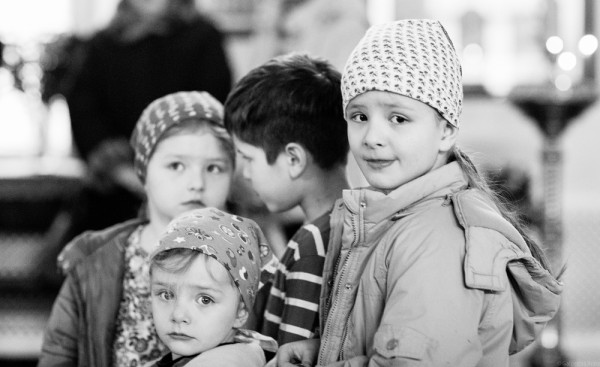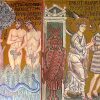Whenever we speak of Orthodox catechism, particularly for children, we tend to think exclusively in terms of school lessons or church visits, of learning symbols and information or experiencing worship. While all this is important, and should form part of the Christian Orthodox instruction and rearing of children, I would like to focus on another aspect of teaching children that is frequently overlooked, and which has been summed up well by St John Chrysostom:
“Let everything take second place to our care of our children, our bringing them up to the discipline and instruction of the Lord. If from the beginning we teach them to love true wisdom, they will have great wealth and glory than riches can provide. If a child learns a trade, or is highly educated for a lucrative profession, all this is nothing compared to the art of detachment from riches; if you want to make your child rich, teach him this. He is truly rich who does not desire great possessions, or surround himself with wealth, but who requires nothing” (Homily 21 on Ephesians)
“Let us train boys from earliest childhood to be patient when they suffer wrongs themselves, but, if they see another being wronged, to sally forth courageously and aid the sufferer in fitting measure” (An Address on Vainglory and the Right Way for Parents to Bring Up Their Children, 66)
Here St John makes it clear that the most important and earliest lessons we should teach our children are the Christian virtues. Note, I did not say “morality” or “family values”, but “Christian virtues”. I am trying to make clear here that Christian virtues are distinct from morality, and certainly from moralism. The above passage from Chrysostom, for example, exhorts parents and teaches to instruct children in learning to love wisdom more than wealth, and spirituality more than glory. How many of us teach our children this? We prefer to urge our children to become wealthy and well-to-do, rather than devout and self-denying. We would prefer our boys to grow up to be doctors and lawyers, not priests and monks. We would be happier to see them millionaires than charitable, patient and humble.
When it comes to teaching our children about Orthodoxy in our schools, we should go beyond learning about customs and religious devotions (things which, quite frankly, they should be learning from their parents at home and in church, not school). Instead, our schools should teach our children about what it means to live as a Christian, how we should treat our neighbour and environment.
Certainly, at the heart of this instruction in virtue should be the Scriptures and biblical stories. Alas, in our day, children grow up knowing nothing of the bible, and it is shameful that our children should grow up ignorant of God’s word and the many wonderful examples of virtue and holiness in the Scriptures. Biblical knowledge is of fundamental importance to the Christian character of our children and their upbringing. As St John Chrysostom writes:
“Don’t think that only monks need to learn the Bible; Children about to go out into the world stand in greater need of Scriptural knowledge.” (Homily 21 on Ephesians)
In addition to Scripture, our children should also be introduced to the lives of saints. The tradition of parents and grandparents passing on such stories is sadly a thing of the past, and here our schools and churches can assist parents who may be lacking in such knowledge. Of particular importance is the patron saints of the children and members of the family. Again, in the words of Chrysostom:
“So let the name of the saints enter our homes through the naming of our children, to train not only the child but the father, when he reflects that he is the father of John or Elijah or James; for, if the name be given with forethought to pay honour to those that have departed, and we grasp at our kinship with the righteous rather than with our forebears, this too will greatly help us and our children. Do not because it is a small thing regard it as small; its purpose is to succour us.” (An Address on Vainglory and the Right Way for Parents to Bring Up Their Children 50)
It is unfortunate, that instead of teaching children the virtues at a young age, and religious beliefs at a later age, we do things the other way around, and try to introduce the Christian virtues to our children when they are in their teens, too obstinate and rebellious to be instructed in the virtues of self-denial, patience, and humility, and too grown up to still be learning Sunday school theology. As our children become young adults, their knowledge in every area of learning increases: science, maths, language, literature, history. But when it comes to religion, we never get past primary school. No wonder many of our young adults reject Christianity as childish. We do not prepare our children for the world as they reach their teens; we do not prepare them for the anti-Christian propaganda they will hear, or the many atheist pupils and students they will befriend.
So, if we are to enable our children to hold on to their Christian heritage and Orthodox tradition, and more importantly, if they are to grow up as devout Orthodox believers, first we must teach them the virtues, the Scriptures, the saints, and then our doctrines and beliefs and church practices and customs. Admittedly, many of our young people will no longer be experiencing these things at home and learning from their parents, and so in addition to the efforts our schools are making to teach our young people, initiatives must be taken to support and instruct parents. I believe that this is something schools and teachers cannot do alone. Clergy and teachers, churches and schools, must work together for the instruction and edification of Christian Orthodox families, young and old. The most important school of all is the family, and if we do not engage with families and teach parents, we are failing our children, and the Church will continue to lose them, if not to the atheist and secular culture which surrounds us, then to other Christian churches or even other religions. And so I will conclude, once again, with the words of St John Chrysostom:
“In children we have a great charge committed to us. Let us bestow great care upon them, and do everything that the Evil One may not rob us of them.” (Homily 9 on 1 Timothy)

















